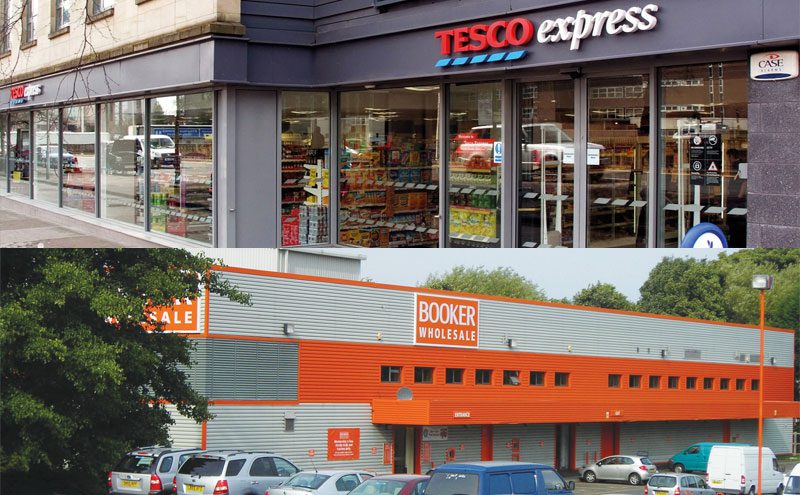Improvements on business rates but questions still linger over DRS, promotions, pricing and a whole lot more

BUSINESS loathes uncertainty but, like it or lump it, over the past 12 months Scottish Grocer has had to cover a fair share of stories that are still well and truly up in the air.
Retailers could be forgiven for entering 2017 with their heads spinning, but it turns out the long wait for clarity continues. While the spectre of Brexit has persistently loomed in the background, movement in the political sphere ranging from potential deposit return schemes to snap elections has kept businesses guessing.
Industry hasn’t been innocent in fueling uncertainty either, as 2017 fast became the year of the acquisition with takeover rumours stacked on top of controversial mergers all mounting up to leave hardly a wholesaler or symbol group out of the headlines.
• Business rates •
Not all the news has been dizzying however, and things arguably got off to a good start in January when Scottish Grocer reported that retail bodies were “broadly happy” with the prelimenary Scottish budget unveiled by finance secretary Derek Mackay in December 2016 – particularly the changes to business rates.
The poundage rate for non-domestic rates was reduced by 3.7% and the large business supplement threshold was increased to £51,000.
A potential rise in income tax rates was also put off.
However, the wheels did fall off the bus for some when this year’s business rates increase arrived in April.
Derek Mackay may have moved to reduce the impact of increases for businesses in Aberdeenshire as well as the on-trade, but it wasn’t enough, according to the Scottish Retail Consortium’s head of policy Ewan MacDonald-Russell who described Mackay’s measures as a “sticking plaster” which would “do little to deal with the underlying problem.” (SG, March)
When Mackay paid a visit to the Scottish Grocer officers in February, ‘wait for Barclay’ was the line but, as Scottish Grocer reported in September, the Scottish Government’s Barclay Review of Non-Domestic Rates brought “no overhaul but some welcome changes for retailers” (SG, September).
One positive note was the introduction of the Business Growth Accelerator which, as reported in October, “brings a 12-month delay for rate hikes for businesses following any upgrades”. That being said, there is still a sense in some quarters that the business rates can has been kicked down the road yet again.
• Deposit Return Scheme •
The very real presence of drinks containers on the public highway was also the subject of political football this year, as January’s Scottish Grocer reported. Former environment minister Richard Lochead was leading calls for the creation of a Deposit Return Scheme with support from a variety of Scottish and international pressure groups.
The debate over DRS made regular appearances in Scottish Grocer throughout 2017. There was plenty of controversy as Coca-Cola – initially appearing to be caught out by a leaked memo opposing the scheme (SG, February) –– backed the proposal, as did the NFRN, while other trade groups voiced strong opposition.
And even though Richard Lochead’s successor Roseanna Cunningham stated that the Scottish Government was “not under immediate pressure in terms of legislation” when DRS was raised by SNP MSP Richard Lyle at a Holyrood committee (SG, July), the First Minister sprung a surprise on the sector a few months later when she announced a Scottish Government committment to implement a Deposit Return Scheme for drinks containers (SG, October).
Will the DRS scheme roll out to all retailers or just the big multiples? How much will it cost? Who will carry that cost? How will the scheme work? What impact will such a scheme have on local authority recycling collection? With all these questions and more still up in the air, an industry holds its breath.
• Petrol and pricing •
Headline-grabbing policies seem to have been the name of the game at Holyrood in the latter part of 2018, with the Scottish Government also committing to ban the sale of new petrol and diesel vehicles from 2032 – eight years earlier than Westminster – raising a few eyebrows at the Petrol Retailers Association. Meanwhile the Scottish Government’s flagship policy from yesteryear, minimum unit pricing for alcohol, was finally given the green light by the UK Supreme Court with MUP scheduled to come into force from May 2018.
• Promotions ban •
As headline grabbers go, a potential ban on promotions of food and drink deamed unhealthy certainly gets the job done. Hot on the heels of a debate on the subject at the Cross Parliamentary Group on Independent Convenience Stores at Holyrood, Public Health minister Aileen Campbell launched a consultation seeking views on proposals including measures to restrict the promotion and advertising of food and drink high in fat, sugar and salt, with suggested remedies including a ban on multi-buys, X for Y deals, and temporary price promotions (SG, November).
• EU tobacco regulations •
Shouldering the weight of government health measures has become a habit for retailers in 2017, with the biggest change of all hitting the tobacco category in the spring.
From May 21, all tobacco products on sale in the UK were required to comply with the EU’s revised Tobacco Products Directive (TPD2) which prohibits the sale of cigarettes in packs smaller than 20, and roll-your-own tobacco in packs smaller than 30g. The May deadline also marked the end of the 12-month sell-through period for branded tobacco products.
• Acquisitions and mergers •
There’s no doubt changes to tobacco regulations made a dent in the turnover figures for many retailers, but there’s few businesses who can bemoan the decline of the category more than Palmer & Harvey.
P&H’s balance sheet has left a lot to be desired in recent years and the wholesaler has been the subject of acquisition rumours for months. Finding a buyer for a beleaguered wholesaler could be a tough task at the best of times, but with P&H’s biggest customer Tesco in the midst of a Competition and Markets Authority (CMA) investigation over a proposed merger with wholesaler Booker, things soon became even more difficult.
Since the merger was first announced, (SG, February) most major wholesalers in the UK, including P&H, have made overtures to the CMA arguing that the deal would be bad for the industry. Nontheless, the deal was approved in mid-November with CMA sign-off expected this month.
Symbols have been up for sale too, with Sainsburys very nearly making an offer for Nisa (SG, July) before The Co-op made its acquisition offer. Questions around the future of Nisa (and others) will no doubt continue to surface long into 2018.





















